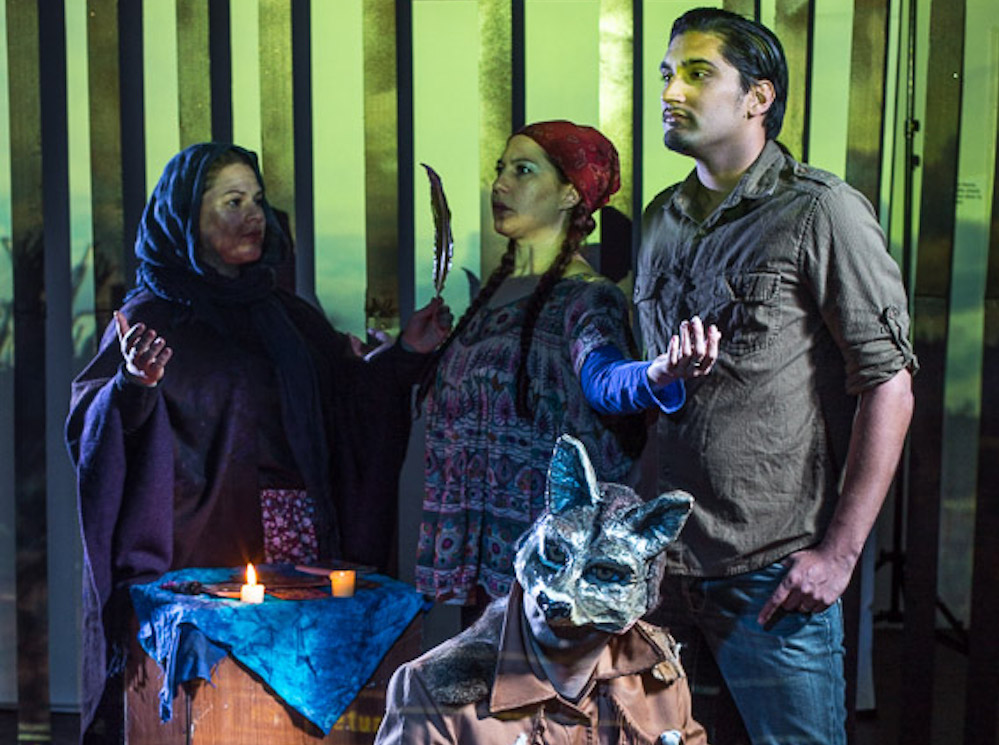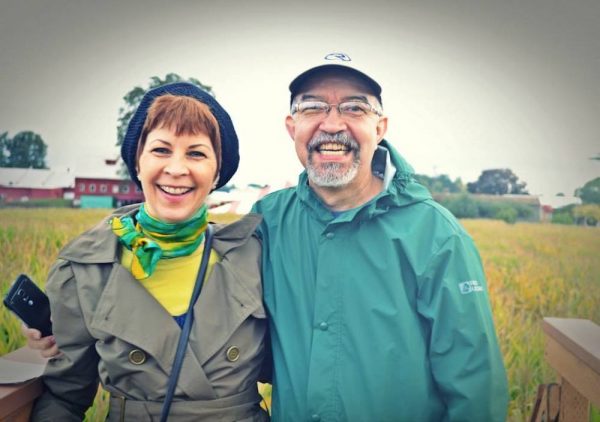
The Milagro’s production of Cuéntame Coyote. Courtesy of Courtesy of Milagro Theatre Group.
It may appear surprising or counter-intuitive to operate a bilingual, Latino-centered theater company in a city that is less than 10 percent Latino.
But for me, my wife Dañel Malán, and our colleagues at Milagro, establishing our artistic home in Portland, Oregon, has afforded creative and community-building opportunities we might not have had if we’d settled in Texas, California, or some other state with a more pronounced Spanish accent.
In one way, I think the organization’s success may be directly related to not being in the center of a major or a significant Latino population. We have articulated a universal approach to Latino stories, as opposed to just identifying with one country (say Mexico) or one ethnic identity (Chicano, for example). We were able to present a menu of theatrical experiences from all over the world and allowed people to learn and to participate.
I’m from Corpus Christi and Dañel is from San Diego. But I moved to Portland in ’67, when I was 15, and went to high school here, and started my theatrical career at the old Portland Civic Theatre. Even though I returned back to Texas in the late ‘70s, I kept coming back here to visit family and also to work on shows.
Quite prosaically, we founded our theater company to create jobs for ourselves. Dañel and I were graduate students and met at UCLA back in the ‘80s, and then we moved together to Portland in ’84, after I finished graduate school. It was a smaller community then, with just a handful of theaters operating. Most of them, like most theater companies, had their little private families, or groups that they worked with. So it was very hard for us to break in.
At that time, Dañel was a costume designer, I was a scenic designer. We thought that doing a show might be a great way of advertising our abilities and getting work.
We started out with an Alan Ayckbourn comedy, Relatively Speaking. Initially we had a pretty commercial viewpoint, and we were not even thinking of being a nonprofit. Our original company was called ArtPaz; a nice blend between “art” and the Spanish word for “peace.” We were eclectic, and learning the ropes as producers. We’d do a melodrama here, and a play from Eastern Europe there, something from England. Then we connected with the Greek community and produced the Ancient Greek Theatre Festival.
It was around 1987 when I started getting pretty homesick for the Southwest. I tried in vain to convince Dañel that maybe we could move back to Texas, but she was adamant that we wouldn’t.
And then a board member of ours said, “You know José, you should really think about doing Hispanic theater.”
I thought he might be right: “Well, if I couldn’t go back home to Texas, maybe I can bring that here, everything that I’m missing—the flavors, the smells, the voices, the climate—I can bring that here by creating a Hispanic cultural festival.” I thought maybe there are other people that feel like me, that are homesick, or missing that special cultural thing that we can’t find here. Lo and behold, we had something like 130 people, mostly Latino, show up for our first auditions for the festival.
As part of our development, we did a lot of work, making phone calls and visiting folks, to get to know people in the community and build a base of support, contacts and information. The dance director at Portland State University formed an entire dance company to perform in the show. Local poets whom we had known for a few years energetically volunteered to read Latin American poetry in English and in Spanish. Musical groups, solo performers and others all jumped in, for the chance to show people what they could do.
It took us a few years to arrive at the decision to do nothing but Latino theater. In 1992, the 500th anniversary of the encuentro between the European colonizers and the Native Americans, we formally dropped the Greek experience and moved on—and haven’t turned back since.

Dañel Malán and José Eduardo González, founders of the Milagro (Miracle) theater company in Portland, Oregon. Courtesy of Courtesy of Milagro Theatre Group.
We did our first Spanish-language presentation in 1993, through Repertorio Español, which is a Spanish-language theater based in New York. It was on a national tour, and they got in touch with us, and we thought it was a great idea, to test the waters and see what might work in Portland. And so we presented them, and pretty much filled up St. Mary’s High School auditorium with the general public and with a lot of Spanish-language students.
One major development came in ’89 with our first Hispanic Cultural Festival, when Dañel produced an original children’s bilingual play called Perez y Martina. That launched the idea of bilingual theater, where we carefully created bilingual scripts that would be fully understood by native and non-native speakers. Teatro Milagro, the company’s national touring program, continues to this day, traveling the country with original bilingual productions
In 2002, we returned to Spanish-language theater again, with a play called “Te llevo en la sangre” by Monica Silver of Argentina. We decided to stage a reading of it, and rounded up enough Spanish-speaking Latino artists and actors to pull it off. We were just amazed: If the fire marshal had shown up we would’ve been shut down.
We knew we needed to focus on Spanish-language, but we took our time. We spent about four years putting on workshops, developing talent, and doing small one-acts and short plays, often in studio settings, so that we could build our capacity and audience. In 2006, we were ready to do something big. The first fully mounted production was Ardiente Paciencia (Burning Patience), about the last days in the life of Pablo Neruda, based on the novel by Antonio Skármeta. We’ve produced it twice in English and twice in Spanish.
Since we started the theatre, Portland’s Latino population has roughly doubled. Now we have good representation from Mexico but also from the Caribbean, Central America, and even South America.
Our Día de los Muertos festival also played a big role in community building. It was the first program that we produced when we moved into our facility in the central eastside industrial district here in Portland. And we included a Day of the Dead altar tour—connecting with Portland businesses to build altars in their space and publishing published a map of the altars so people could come and tour them.
For our mainstage programs, about 30 percent of our audience is now Latino. Our touring program tends to have a much higher percentage of Latino attendees, both in schools, universities and in public forums—70 percent and above.
One of the mantras around here is that we’re not a Latino-only club. That’s helped our relationships with non-Latinos; it’s also helped that we don’t advocate for particular political positions. Instead, we let the work speak for itself.
We strive for authenticity, culturally and otherwise. If we water it down, then it really becomes something else, and we’re not really being true. What drives us is to be true and honest with our audience—not to berate them or stand on soapbox.
Our goal is to present a story that is believable, that is seen in a different way, so that hopefully the audience will return, and enjoy us in yet another artistic experience.




Send A Letter To the Editors